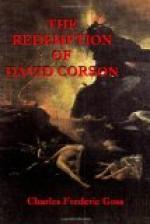“She asked me if her father was going to send her to Philadelphia this winter,” she answered, without lifting her eyes.
“I don’t mean that!”
“She asked me whether I could tell them where to find the spotted heifer.”
“The d-d-deuce, child! Why don’t you tell me what she asked you ’bout D-D-Davy?”
“It is time for us to go to supper or we shall be late,” she replied, laying aside her work and rising.
“Sure enough!” cried the doctor, springing to his feet. “The Q-Q-Quaker has knocked everything out of my head. Come on!”
He rose and began bustling about the room.
When Pepeeta glanced up from her work she saw in David’s eye a grateful appreciation of her courtesy and tact, and his look filled her with a new happiness.
The disgust awakened in the Quaker’s mind by the coarseness of the quack was more than offset by the beauty and grace of the gypsy. When he looked at her, when he was even conscious of her presence, he felt a happiness which compensated for all that he had suffered or lost. He did not stop to ask what its nature was. He had cast discretion to the winds. He had in these few hours since his departure broken so utterly with the past that he was like a man who had been suddenly awakened from a long lapse of memory. His old life was as if it had never been. He felt himself to be in a vacuum, where all his ideas must be newly created. This epoch of his experience was superimposed upon the other like a different geological formation. Like the old monks in their cells, he was deliberately trying to erase from the parchment of his soul all that had been previously written, in order that he might begin a new life history.
CHAPTER XII.
THE MOTH AND THE FLAME
“Misled by Fancy’s
meteor-ray
By
passion driven:
But yet the light that
led astray
Was
light from heaven.”
—Burns.
A little before dusk the three companions started upon their evening’s business. The horses and carriage were waiting at the door and they mounted to their seats. David was embarrassed by the novelty of the situation, and Pepeeta by his presence; but the quack was in his highest spirits. He saluted the bystanders with easy familiarity, ostentatiously flung the hostler a coin, flourished his whip and excited universal admiration for his driving.
During the turn which they took around the city for an advertisement, he indoctrinated his pupil with the principles of his art.
“People to-day are just what they were centuries ago. G-g-gull ’em just as easy. Make ’em think the moon is made of g-g-green cheese—way to catch larks is to p-p-pull the heavens down—extract sunbeams from c-c-cucumbers and all the rest! There’s one master-weakness, Davy. They all think they are sick, or if they d-d-don’t, you can make ’em!”




